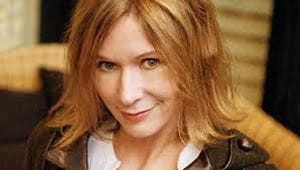
And it was a label that Phillips would not wear.
Refusing to be penned in by the expectations and limits of the Christian music industry, Phillips walked away from her Myrrh contract and reemerged soon after on Virgin Records as Sam Phillips, singing about her need for "God" and "not the political church."
Under her given name, Leslie Phillips sang about being "black and white in a grey world," where she didn't fit. "I don't mind being different," she sang, "because I'm different for the truth."
At the time, it seemed like a clear statement of faith in the face of a world filled with moral and spiritual relativism. But looking back, perhaps the lady hath protested too much.
For her entire career as Sam Phillips, she appears most comfortable dwelling in the gray areas of life -- the in-betweens, margins and conundrums of life and faith.
For her rabid fans -- and they are legion -- the paradoxical tension Phillips embraces in her songs is the heart of her appeal. She is honest about what she feels and what she doesn't know. It's an uncommon quality, and one that makes her music both enigmatic and enduring.
Her longing for God remains, as does her chafing at the politics of "church."
"It's very difficult for me to talk about spirituality with a spiritual language that a lot of people use because it's not big enough.
The vocabulary needs to be bigger," Phillips said recently by phone from her home in Los Angeles.
"I do get frustrated when the church becomes a mouthpiece for the political right wing in this country. It's sad to me ... It just seems like love has been left so far behind. Now it's screaming with your fingers in your ears; that's what Christianity has come to mean to so many people.
Out on the road, Phillips often encounters fans who first knew and loved her as Leslie and, like her, felt alienated from the church for one reason or another. "They're still listening to me now, years and years later because of that," she said. "I think that they felt they I was on the journey with them, which I have been."
Phillips continues to forge her own path, most recently eschewing a traditional record contract and instead releasing her music directly to her fans via a $52 digital subscription on her Web site, SamPhillips.com.
Through the online project, titled The Long Play, Phillips began releasing new songs -- nearly 50 across six digital-only albums -- in 2009, culminating with the 10-song Cameras in the Sky in February 2011.
Phillips and husband/music producer T-Bone Burnett, with whom she has a 13-year-old daughter, split a few years back, but she speaks of him fondly and with great respect. She sings of a child's tragic death, classic Christmas tunes and several songs inspired by the life of evangelist Aimee Semple McPherson.
A study in contradictions, McPherson, too, was a "maverick" in many ways, said Phillips, a native of the Los Angeles area where McPherson founded her Angelus Temple in the 1920s, which grew into the International Church of the Foursquare Gospel.
McPherson was an entrepreneur, a performer and a preacher of a very traditional gospel. She railed against the evils of popular culture and yet employed the costumes, staging and media of early Hollywood to draw thousands to her congregation. She lived lavishly, yet fed droves of the poor during the Great Depression. A woman of God, she fell from grace when she fell in love with a man who wasn't her husband.
"The fact that she was flawed," Phillips explained, "was fascinating."
Phillips finds great beauty in imperfection.
"Don't let perfect make you blind to this beautiful world," Phillips sings in "Magic for Everybody." "Don't erase your crooked lines. Take your mistakes and come with me."
On the final track of The Long Play, Phillips turns her attention back to her familiar gray territory.
"People do all the wrong things for the right reasons, and somehow you understand this," she sings. "I'm so glad you're here. So glad."
For Phillips' devoted fans, the feeling is absolutely mutual.

